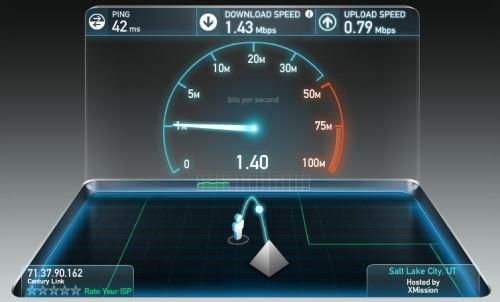It seems we all want better, faster, smaller, and lighter when it comes to our mobile devices. Why wouldn’t we? When we’re talking about size and weight, you won’t find many who argue that our devices are all sufficiently small and light. Most OEMs these days are quibbling over a few millimeters or several grams when it comes to size and weight. Speed, however, is different.
In the past we’ve talked about processors, about how many cores they have and how fast those cores are, and what kind of architecture they’re built upon. We’ve talked about the quantity and speed of RAM and internal storage. We’ve even talked about graphics handling and how many graphics cores new devices are tucking away inside their plastic and glass shells. But does all this really add up to “speed”?
“Speed. I am speed.” — Lightning McQueen
How Fast Is It?
We can measure speed in megahertz and gigahertz. We can measure it in megaflops per second. We can measure it in frames per second. We can even measure speed in benchmark scores that are relative to one another. When it comes right down to it, all of these measurements, though helpful, don’t answer the question: how fast is it? What exactly is “speed”?
Data
Here are my desktop speeds. My wireless speeds, on the other hand, are usually more than 4Mb down and 0.5Mb up.
I’m writing this article connected to a DSL line not unlike many of you may have at your home. Downloads are fairly snappy, but not particularly noteworthy. My Nexus 4, however, easily doubles the speeds I get on my desktop (and is often more than three times as fast).
Why we get these speeds over the air and not over a wire still baffles me. There’s no doubt, in many cases your smartphone is much faster than your desktop computer. Others may have faster wired connections, that’s not in question. Our very own Anton D. Nagy gets something like a bajillion bits down and almost the same up.
Even still, when we talk about data speeds, what you’re usually interested in is latency (ping rates) rather than upload or download rates. Generally speaking, you’re interested in how quickly something you asked for is returned to you — the data itself is typically fairly small. Sure, pictures, videos, and music rely on fatter pipes, but when you look at all your data requests, you’ll find the “fat pipe” requests are usually in the minority.
Start Me Up
Another way to measure speed is how quickly your device is ready to respond to your requests. Most of us never turn our smartphones off these days, they’re in standby, waiting for us to turn them on. When we pick them up and press the “on” button, they awake almost instantaneously.
Desktop computers are usually shut down at the end of the day or after each use — or are in some sort of hibernation mode. Resuming from these state, even with an SSD and a very fast computer, can take anywhere from several seconds to a few minutes. Even turning on my monitor and being presented with my desktop takes at least 15 seconds.
Common Tasks
We use our electronic devices for doing “stuff”. Whether getting or sending email, sharing content on social networks, ordering pizza, or paying bills, the way we go about accomplishing these everyday tasks varies significantly between how we do them on mobile versus desktop.
One might argue that mobile apps are crafted to allow quicker interaction than their desktop counterparts. That’s my point. Sure, desktop versions of these apps or websites could potentially be as fast as mobile apps, but they’re not, and I doubt they ever will be.
Updates and Patches
This one might come as somewhat of a surprise: application updates. My smartphone always has the most recent version of every app I’ve installed on it — and updates are fairly frequent. Desktops apps have generally been slow to update, and those updates are usually only to patch security problems. Windows 8 is pushing us toward way mobile operating systems update their apps, but not every app that runs on Windows 8 gets updates this way, and probably won’t for quite some time.
So Say We All
Yes, mobile devices run mobile operating systems that are tweaked, tuned, and optimized for speed. Sure, there are some things that I either cannot do, or wouldn’t want to do given the limitations of today’s mobile devices.
Even still, I’d much rather reach for a smartphone or tablet than switch on my desktop or laptop computers. I can get most tasks done faster and more conveniently on my mobile devices than on their “big brother” counterparts.
What about you? Is your smartphone faster than your desktop computer, or is it the other way around? Let us know how and why you’d rather use your smartphone than a traditional computer in the comments below!
—
Image Credits: Disney Pixar; SpeedTest.net



